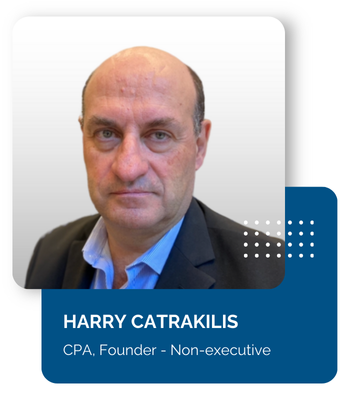Footsteps Toward Professionalism
- June 19, 2024
- Posted by: Harry Catrakilis
- Category: Blog

Analyzing the Evolution of Professionalism
Professionalism is a term that has changed over the years, and with it, its impact upon the audit and accounting industry. This blog explores one of the foundational texts that defined professionalism, and Harry Catrakilis’s perspective on these outlined principles.
“In the 1980s, as I started my professional career in accounting,
there was a real sense of pride in distinguishing accounting as a profession rather than a trade. Now, reflecting on the current state of the profession, it seems we’ve deviated from that path.
These thoughts led me to revisit some foundational texts, and I found valuable insights worth sharing.
Joseph S. Glickauf’s work, “Footsteps Toward Professionalism,” written in October 1963, provides an in-depth understanding of what constitutes a profession and what it means to be a professional. The terms “profession” and “professional” have become somewhat diluted over the years, often used as general compliments. But what do they truly signify? Why, for instance, are aircraft designers deemed professionals while the builders are not?
Glickauf outlines ten attributes that define a professional:
1. Highly skilled
2. Highly educated – which means also broadly trained. Difference between X-ray technician and a medical Doctor.
3. Holds and cannot escape the ultimate responsibility for his work.
4. A person of unimpeachable integrity. He goes on to say that does not mean nonprofessionals have less integrity but rather that his professional status makes it more likely that the professional will be given an opportunity for skullduggery or to get improper gain. For example, a medical doctor who performs unnecessary procedures.
5. He/she practices within a framework of a code of ethics which defines professional standards of conduct.
6. A professional requires certain specific mental skills. High in that order are analytical and creative skills. A professional is required to analyze a problem and then develop a solution.
7. Recognized professions involve broad bodies of knowledge. It is therefore incumbent on the professional to not only develop an original level of competence but also to meet the challenge of evolution through a lifetime of self-improvement.
8. A professional has attention to detail and sets his own high standards. Someone asked Michelangelo why he worried about the detail of his painting since No one would know. And he said, “I would know if it were bad.”
9. Altruism – not found in the commercial business world. But a professional is concerned with being of service to all who need his talents.
10. A professional is a member of a group which is banded together into a strong professional organization. Among other things the organization has a process of self-discipline imposed upon individual members by the organization as a whole.
These principles were rooted in me during my formative years. However, I now feel that I am observing an erosion of these attributes, particularly among large firms that seem to prioritize expedience over these foundational qualities. Society’s demands have shifted, making it challenging to uphold these standards universally.
From Glickauf’s list, three attributes stand out: ultimate responsibility (point 3), unimpeachable integrity (point 4), and altruism (point 9). While these attributes may be leaders among equals, cherry-picking desirable characteristics undermines the essence of professionalism. And unfortunately, this selective adherence is becoming common, with larger firms often evading accountability, prompting increased government intervention. This raises a critical question: if the government must enforce standards, are we still a true profession? Without self-imposed standards and discipline, our professional identity is at risk.
At our firm, we strive to uphold all these professional principles. In future discussions, I will share examples of our successes and areas where we have faltered, demonstrating our commitment to maintaining the integrity of our profession.” -Harry Catrakilis
The above article only intends to provide general information and reflection. It is not designed to provide specific advice or recommendations for any individual. It does not give personalized tax, financial, or other business and professional advice. Before taking any form of action, you should consult a financial professional who understands your particular situation. CKH Group will not be held liable for any harm/errors/claims arising from the blog. Whilst every effort has been taken to ensure the accuracy of the contents, we will not be held accountable for any changes that are beyond our control.
About the Author
Harry Catrakilis has over 30 years of experience in the practice of public accounting, corporate financial management, and investment banking. He was managing partner of CKH from 2003 until summer of 2018 when main operations were passed on to CEO Nico Meyer. This blog was written by and is the candid reflections of Harry Catrakilis.


